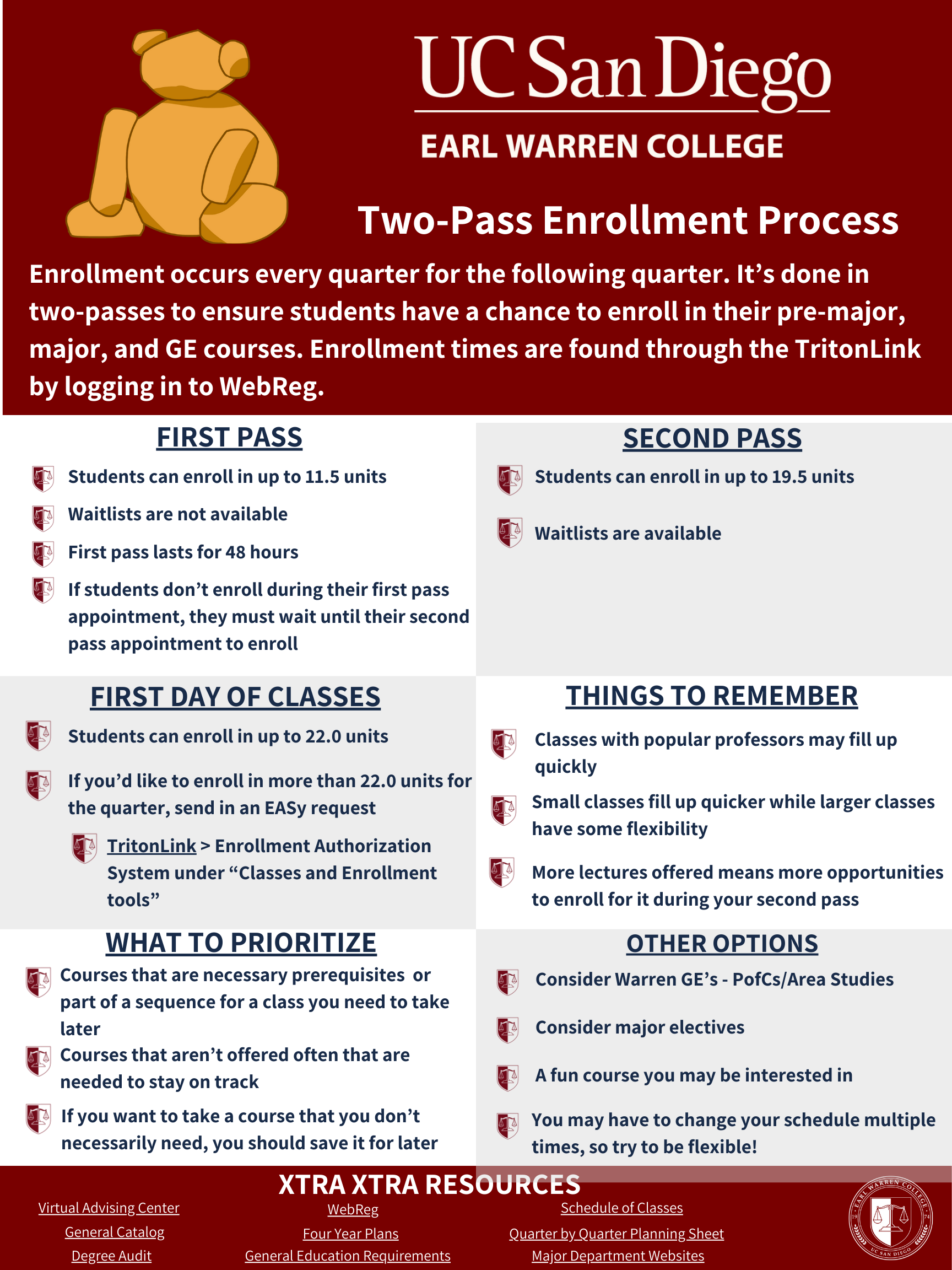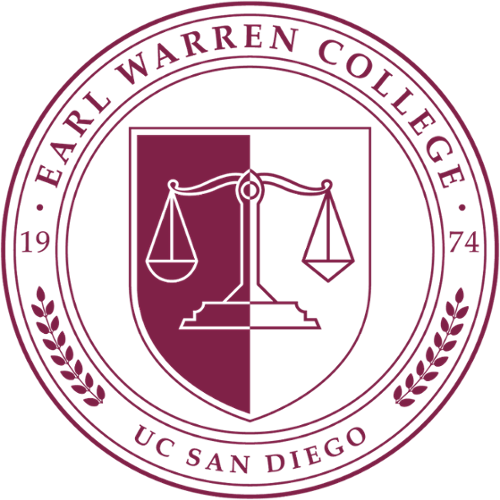First Year Student Advising Information 2025
2025 Enrollment Webinar
Getting Started
Timeline
What to Expect
From May through September, you will receive emails with important information and approaching deadlines. Be sure to check your UC San Diego email account regularly. Follow the timeline below for important Academic and Orientation dates/deadlines.
|
MAY |
|
|
May 1 |
|
|
JUNE |
|
|
June 18 |
|
|
June 18 |
|
|
JULY |
|
|
July 1 |
|
|
July 2 |
|
|
July 25 |
|
|
July 28 |
|
|
AUGUST |
|
|
August 14-16 |
|
|
August 19-21 |
|
|
SEPTEMBER |
|
|
September 17, 18, 20 (tentative) and 22 |
|
New Triton Advising Portal
The New Triton Advising (NTA) Portal will open for all first year students on June 18th. It is housed in the Virtual Advising Center (VAC), and includes important information on the advising system, academic requirements, and enrollment. First-year students will be able to do the following:
- View University, and Warren College general-education requirements.
- Please go here to learn more about University Requirements.
- Please go here to learn more about Warren College GE’s.
- Once you have completed the NTA and submitted your Academic Background you will be able to contact your major and College Advisor through the “Ask a question” tab in the VAC.
- The deadline to submit your Academic Background is July 2nd.
- You can't access online advising until your Academic Background is submitted!
- Learn next steps after NTA is completed.
Warren College Emails
Check your UC San Diego email account frequently for important communication from Warren College. Emails will include information and updates regarding the First Year Orientation program, important events, and deadlines for new students.
Preparing for Your First Quarter Enrollment
The Quarter System
- There are three quarters in an academic year at UC San Diego: fall, winter, and spring. UCSD summer sessions are optional.
- Review this webpage for a detailed explanation of the quarter system.
- A quarter is 10 weeks with final exams Week 11.
- Midterm exams may begin as early as Week 3.
- The quarter system moves quickly, so it is important that you stay prepared and not fall behind.
- For information on summer classes, visit the Summer Session website.
Course Information
- When you enroll in a course with a discussion section, you are committing to both the lecture and the discussion for the entire quarter.
- The lecture (LE) is often a large group of 200+ students. The majority of courses will have a lecture and a discussion section. Not all courses have discussion sections.
- The discussion (DI) section is a smaller group of students (40 or less), usually taught by a graduate student. This is the interactive part of the course where:
- assignments are given and collected
- questions are answered
- lecture material is reviewed and discussed
- You may view your final exam schedule on TritonLink as you enter courses onto your course enrollment plan.
- Check for scheduling conflicts (e.g., conflicting final exam dates).
Placement Exams
- Math Placement Exam (MPE): Needed to determine proper placement in precalculus course or an introductory calculus course at UC San Diego, if not yet met.
- Writing Placement Process (WPP): Needed if the Entry Level Writing Requirement (ELWR) has not been satisfied.
- See Additional Placement Exams as needed.
- Please go here to see how AP/IB scores will give you credit for College GE’s.
Choosing Classes
-
Your goal is to have a preliminary schedule of classes for fall. A typical first quarter schedule consists of three or four courses, a total of 12-16 units.
Here is an example:
- Lower-Division Major Course - for undeclared majors, choose a course to explore a prospective major
- Major Course - a second major course, Diversity, Equity and Inclusion (DEI) course, Jane Teranes Climate Change Education (JTCCER) course, or an elective course
- WCWP 10A or AWP 3 or AWP 4A
- General-Education Course (GE) – a Program of Concentration (PofC) or Area Study course
- Be sure to have 1-2 back up classes that have open seats.
- We do not recommend waitlisting courses however if you choose to do so please go here for more information.
- You must be enrolled in a minimum of 12 units to be a full-time student, wait-list classes do not count.
- Most classes at UC San Diego are 4.0 quarter units.
- We recommend that first-year students do not enroll in upper-division courses (those numbered 100+) in their first year.
- We recommend using the academic plans website to help guide you on what classes to take in fall quarter. Remember these are sample plans and do not take into consideration any AP/IB/community classes you have taken.
- Please go here to see how AP/IB scores will give you credit for College GE’s.
- When planning your schedule, consider co-curricular activities to maintain a balance with your academic schedule.
Enrolling in Fall Quarter
- Review the online WebReg Tutorial to learn how to enroll in classes.
- You can complete a Course Enrollment Plan on WebReg. Your planned courses are not official until you are enrolled.
- To plan a course on WebReg, type the course name in the “Search for Classes” bar at the top left of the webpage. Select the course you wish to plan and click the “plan” button. The course will be listed on your plan.
- Make sure you have no holds on your account prior to your enrollment time.
- To officially enroll in the course, at your enrollment time, click the “enroll” button for the course.
- Avoid classes with time conflicts including final exams.
Undeclared, Selective, or changing majors
Undeclared majors can choose courses that they are interested in taking for a possible major. They have the freedom to choose coursework that best interests them.
- Check out this Undeclared Majors workshop for additional assistance and information.
Students wanting to change into a selective major will need to review the screening courses, and the application process. Entrance into all selective majors requires a formal review process. Approval is not guaranteed.
If the student is interested in changing majors (except selective majors) they can do so once Fall quarter begins using the major/minor tool.Enrollment Information
Important Dates
- June 18: Once you have fully completed the NTA and submitted your Academic Background you can send questions to your major and college advisors using the “Ask a question” tab in the Virtual Advising Center (VAC).
- July 28: View your first and second pass enrollment appointment times on TritonLink.
- August 14-16: First pass begins. Enroll in courses using WebReg during your first and second pass appointment times. *Once you have officially enrolled in a class you will have access to Zoom and In-person advising.
- August 19-21: Second pass begins. Enroll in courses using WebReg during your first and second pass appointment times.
First and Second Pass Enrollment
- You are allowed to enroll in 11.5 units during the first pass and 19.5 units, including wait-listed courses, during the second pass up until the first day of instruction.
- If you do not enroll during your first pass appointment, you must wait until your second pass appointment.
- Once you have officially enrolled in a class you will have access to Zoom and In-person advising.

Academic Advising
June 18: Once you have fully completed the NTA and submitted your academic background you can begin to send questions to your major and college advisors using the “Ask a question” tab in the Virtual Advising Center (VAC). College Advisors will respond to inquiries throughout the business week and most questions will be answered within 24-48 hours. **Remember to submit your Academic Background and completely review the New Triton Advising site in order to receive access to the Virtual Advising Center.
August 14-21: Once you have officially enrolled in a class you will have access to Zoom advising. To access Zoom advising (during Zoom drop-in hours) use the “Meet with Advisor” tab in the Virtual Advising Center.
- To prepare for Online Advising, review your academic information, potential four-year plan, and College GE’s in the New Triton Advising portal.
- Submit questions in advance of your enrollment time, since Online Advising will be in high demand.
- Appointments will not be available until Week 2 of Fall quarter.
Preparing for Academic Success
- Your actual study time will depend on the material being covered, your familiarity with the material, and your study skills. A good rule of thumb is to spend three hours outside of class for every hour spent in lecture.
- For a typical 4.0 unit class (three hours of lecture), you will study about nine hours per week.
- UCSD offers tutoring assistance for many classes. Please go here for more detailed information.
- Tips for Academic Success
Academic Resources
Use the following important resources:

